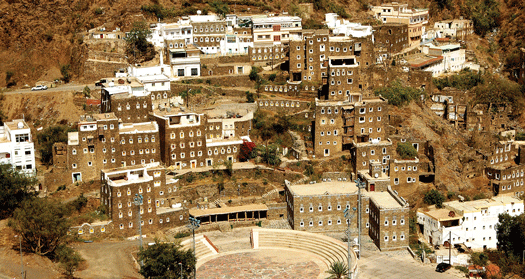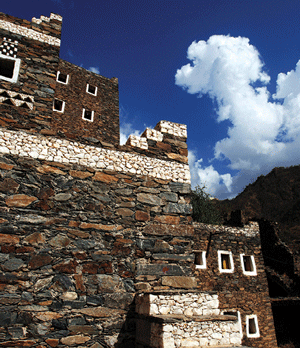
Rijal Alma
Invents Itself
 |
The winner of the Prince Sultan bin Salman Prize for Preservation of Urban Heritage
in 2006, Rijal Alma literally invented itself.
Located in the Tihama area of the Asir Province, it lies 45 km west of the tourist city of Abha and only 500 meters from the main road that connects the city of Mahayel Asir and Darb Bani Shubah.
By Roger Harrison
Photos By: Sulaiman Mutowa
It has been around a long time and once was the capital of the principality of Hala during the reign of Mossa Al-Kenani in 732H. It is an ancient Asiri village set in an extensive valley on the trade route between Yemen, Makkah and the Red Sea. Significantly, Asir translates as “difficult” — and describes both the geography of the area and some say the stubborn and tough character of the mountain people of the area. They certainly put those characteristics to good use a couple of decades ago when the inhabitants of the village decided to keep and restore their ancestral home and not abandon it to the temptations of glittering modernity.
 “Rijal Alma village has introduced itself independently. The residents initiated the rehabilitation work a long time ago to attract tourists to the area and benefit from its economic potential,” Prince Sultan observed on presenting their prize. “We learned a lot from the Rijal Alma experience; we ought to help and support them through this project. What you have seen now is an example of public and private sectors and local community solidarity and cooperation.” The result of the villagers’ gritty individualism is a living museum that has become one of the most popular and distinctive tourist attractions in Saudi Arabia. The people of Rijal Alma are mainly from the Tihama tribe, whose way of life has similarities to Yemeni culture. The Tihama are also known as the “flower men” from their custom of wearing garlands of dried herbs and flowers in their hair. Traditionally, these hill men were considered by plain dwellers to be one of the fiercest tribes in the Kingdom. Their communities are still very much influenced by tribal law and customs resulting in a distinctive character within the context of the Saudi nation.
“Rijal Alma village has introduced itself independently. The residents initiated the rehabilitation work a long time ago to attract tourists to the area and benefit from its economic potential,” Prince Sultan observed on presenting their prize. “We learned a lot from the Rijal Alma experience; we ought to help and support them through this project. What you have seen now is an example of public and private sectors and local community solidarity and cooperation.” The result of the villagers’ gritty individualism is a living museum that has become one of the most popular and distinctive tourist attractions in Saudi Arabia. The people of Rijal Alma are mainly from the Tihama tribe, whose way of life has similarities to Yemeni culture. The Tihama are also known as the “flower men” from their custom of wearing garlands of dried herbs and flowers in their hair. Traditionally, these hill men were considered by plain dwellers to be one of the fiercest tribes in the Kingdom. Their communities are still very much influenced by tribal law and customs resulting in a distinctive character within the context of the Saudi nation.